Deep Bend Landing
A gem
Such peace and quiet. Nothing but the sound of the wind, the crackle of a camp fire and an occasional bird calling.
Campgrounds near Sapelo Island offer a mix of coastal and inland camping environments throughout Georgia's southeastern barrier islands. Cabretta Island Pioneer Campground on Sapelo Island provides tent, RV, and cabin accommodations with boat-in and drive-in access via ferry. Several surrounding campgrounds like Jekyll Island Campground, Blythe Island Regional Park, and Belle Bluff Island Campground feature waterfront sites with varying amenities. The region includes both primitive camping areas and full-hookup RV parks within a 30-mile radius of Sapelo Island.
Ferry access is required to reach Sapelo Island's camping areas, with advance reservations strongly recommended for both transportation and campsites. The campgrounds throughout this coastal region experience high humidity and insect activity, particularly during summer months. "I love this campground! Plenty of trees for hammock camping, which is what I prefer, as well as many options for tent set ups. You take a ferry to Sapelo island, then a bus takes you to Cabretta Campground. Heaven on earth, just don't forget the bug spray," noted one visitor. Most campgrounds in the area provide electricity and water hookups, with several offering full RV connections. Boat-in access is common at many sites, creating additional transportation options beyond standard vehicle access.
Waterfront camping represents a significant draw throughout the Sapelo Island region. Campers frequently mention the proximity to beaches and marshlands as key highlights of their experience. At Cabretta Island, visitors appreciate the short walking distance to both beach and marsh ecosystems. According to one camper, "The campsite is a 3 to 5 minute walk away from both a beautiful beach and amazing marsh." Mixed-use campgrounds in the area typically provide covered pavilions, established fire rings, and basic restroom facilities. Several RV parks in the region like Lake Harmony and McIntosh Lake feature spring-fed lakes with fishing opportunities and waterfront sites. Group camping is available at select locations, with Cabretta Island particularly noted for accommodating larger gatherings with its communal pavilion and multiple Adirondack shelters.
$36 - $51 / night
"Jekyll Island County Park is located at the northern end of Jekyll Island, a barrier island at the halfway point along the Georgia Coast. "
"This campground is in a beautiful setting with lots to see and do close by the park."
"I stayed at Blythe Island Regional Park in Brunswick, Georgia, and liked it. The campground is quiet with lots of trees and wildlife. I saw rabbits every day, which was fun."
"They confirm but only assign you a site on arrival- you cannot choose it Our campsite consisted of a hard packed sand "driveway" and a concrete pad next to it."
"A clean and well maintained RV park located right next to I-95 in Georgia for those looking for a quick in and out overnight stay."
$42 / night
"Established fire pit, large covered pavilion with multiple picnic tables, electrical hookups located within pavilion and a shower house equip with sinks and toilets. Walking distance to the beach."
"Absolutely beautiful, complete with bathrooms and many adirondacks to keep supplies dry, the campsite is a 3 to 5 minute walk away from both a beautiful beach and amazing marsh. Highly recommend."
$35 - $40 / night
"Lake side grassy sites, with plenty of room. Quaint with swimming and fishing. Lake side patios with fireplaces. Free fire wood for your campfires. Reasonable rates"
"Beautiful little campground where nearly every site has a view of the largeish fishing lake. All sites are natural with no pad, but full hook up. The wifi is good and the staff are cordial."
$45 - $60 / night
"We took an evening excursion to a nearby restaurant (Fish Dock @ Pelican’s Point) and the food was great."
$44 - $49 / night
"Great fishing, they have a pond and a lake with paddle boat rentals. It’s so quiet, and quaint."
"The campground had a small lake (pond) and there was a swimming area available which we did use."
$45 - $165 / night
"My favorite campground...nestled in a maritime forest, the live oaks and Spanish moss, drip and dance around you, lending an air of romance and other- worldly feel."
"We used the park as a base to experience Georgia's low country."
"Great areas to walk your dog, nice pond adjacent to park ( no swimming due to aligators) but lots of activity, fish, turtles, birds, etc. Winn Dixie, liquor, fuel etc nearby. "
"The location is not fancy, but the park has adequate and clean facilities including; 3 bath houses, 3 laundry facilities, a dog park, clubhouse & pool."
$12 - $230 / night
"We enjoyed the well-kept campground and explored the civil war fort which inspired discussions of Georgia’s history. Too hot to have an enjoyable hike, though."
"Even in winter, Fort McCallister campground was nearly full and for the most part with large, really large and really, really large RVs."
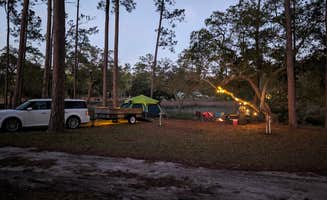
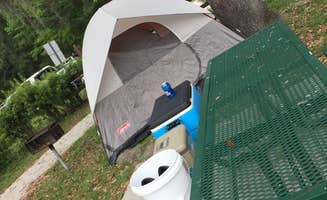
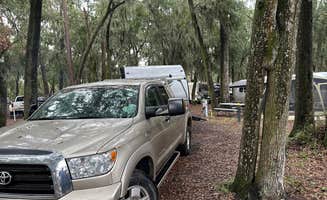
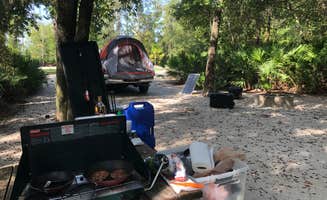
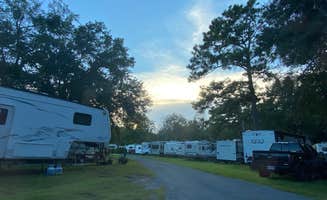
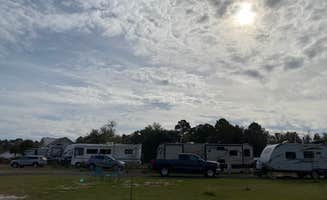
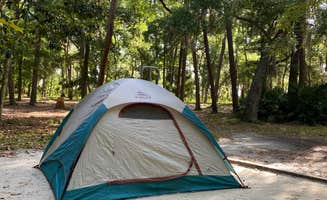

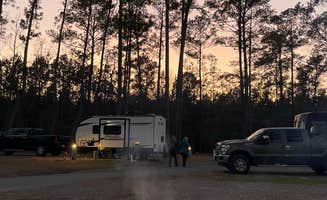

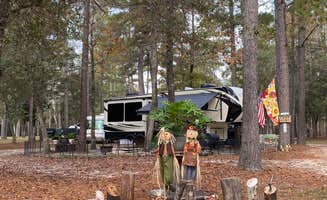
Such peace and quiet. Nothing but the sound of the wind, the crackle of a camp fire and an occasional bird calling.
Nice clean camp spot. Nice wide locations. Not far from 95 but the traffic noise is hardly noticeable.
I didn’t get to stay there but walked around for about an hour. But it’s on my list on the way back to Pa when I go.
Spent a cold week and a half here in January escaping storm Fern. Nice level spots with electrical and water hookups. Cell service (Verizon and AT&T) were decent enough to watch TV and for me to work with multiple video meetings. Trails are nice if you like to see swamps and estuaries. Some very pretty birds and you can hear the owls talking to each other at night. Bathrooms were warm and clean. Good laundry machines too. Cycling around here is not great. Very flat hardly any bike lanes and lots of straight roads.
The people here are nice. Perhaps it’s the southern hospitality or just the type of person who works in a state park. The campgrounds are well maintained. Sites are level for the most part. Showers are pretty good with hot water and the laundry machines look newer. Leave it better than you found it.
Easy in & out location. Wooded throughout. Full hookup pull thru sites available & they even have “paw pen” sites with private fenced areas for dogs. Very friendly staff. Right off of the highway so you can hear traffic if you’re outside but not inside. Little store with the basics. Doggy poo stations throughout. Cute pool with a waterfall & slide. Small playground and dog park.
Well managed quiet and friendly
I spent several days here. Enjoyed the nature. Saw an armadillo, raccoon and lots of deer. Was able to do laundry and shower in the same building. I appreciate the handicap accessible showers.
I stayed at Blythe Island Regional Park in Brunswick, Georgia, and liked it. The campground is quiet with lots of trees and wildlife. I saw rabbits every day, which was fun. The RV sites are big, and the hookups worked well.
The park has a lake, trails, a marina, and playgrounds. It is close to St Simons and Jekyll, so it is easy to explore the area.
A few things to be aware of. Some roads in the campground are bumpy, and some sites are sandy. We heard an odd noise at night. But it was not a drive-you-crazy noise.
Overall, it is a peaceful place, and I would stay here again.
Camping near Sapelo Island ranges from salt marsh sites to inland forest settings across Georgia's coastal region. Access to most camping areas requires planning around ferry schedules, which run three times daily from the mainland. Summer temperatures typically exceed 90°F with high humidity, while winter camping brings milder 60-70°F days with notably fewer insects.
Beach exploration: 5-minute walks from Cabretta Island Pioneer Campground provide access to undeveloped shorelines. "The campsite is a 3 to 5 minute walk away from both a beautiful beach and amazing marsh," notes camper Jonah D. The campground's proximity to both ecosystems allows for daily exploration of different coastal environments.
Civil War history: 15-minute tours at Fort McAllister State Park Campground take visitors through preserved earthwork fortifications. "We planned this trip to coincide with the annual Civil War reenactment of Sherman's last battle on his way to the sea. It was our first reenactment and was interesting," shares William N. The fort's museum contains artifacts recovered from the Ogeechee River and surrounding battlegrounds.
Fishing: Multiple locations throughout the coastal region offer both freshwater and saltwater options. "My son fished from the dock the entire time we were there and loved it," reports Ashley W. about Belle Bluff Island Campground. Many sites provide direct water access for shore fishing, while boat launches accommodate those bringing vessels.
Wildlife viewing: Dawn and dusk offer prime wildlife observation times at many campgrounds. "Deer and other wildlife are seen every day," writes Pamela I. about Skidaway Island State Park. The variety of ecosystems from maritime forest to salt marsh supports diverse wildlife populations including raccoons, deer, and numerous coastal bird species.
Spacious sites: Extra room at Jekyll Island Campground allows for comfortable setups. "I love Jekyll Island! It has a great campground and it's within walking/biking distance to the beach. I go over there as often as I can. It's family friendly and pet friendly. It's always clean and the sites are a pretty good size too," explains Marysa H. Most sites accommodate multiple tents or larger RVs with room for outdoor gathering areas.
Waterfront camping: Lake access at multiple campgrounds provides recreational opportunities. "Beautiful little campground where nearly every site has a view of the largeish fishing lake. All sites are natural with no pad, but full hook up," says Thom C. about McIntosh Lake RV Park. Many campers appreciate the ability to fish directly from their sites or enjoy water views throughout their stay.
Ferry logistics: Advance planning required for Sapelo Island access. "You take a ferry to Sapelo island, then a bus takes you to Cabretta Campground," explains a visitor. Ferry service operates three times daily with limited capacity, so reservations should be made weeks in advance during peak season.
Wildlife precautions: Secure food properly against nocturnal visitors. "Do NOT leave food or trash unattended or they will ransack your campsite," warns Hannah C. about Fort McAllister State Park. Many campsites throughout the region experience regular raccoon activity after dark.
Road conditions: Variable quality across campgrounds can affect access. "Roads are poor, rutted and full of holes," notes Liz M. about Blythe Island Regional Park. Some campgrounds maintain paved roads while others have natural surfaces that may become muddy during rainy periods.
Playground access: Multiple options for children throughout the area. "Lots of stuff for the kids to do!" says Kyle W. about Fort McAllister State Park. Several campgrounds feature playground equipment convenient to camping areas, though equipment quality and maintenance vary considerably.
Swimming opportunities: Designated areas available at select locations. "There is a small lake (pond) and there was a swimming area available which we did use," shares Ashley W. about Lake Harmony RV Park. Most swimming locations lack lifeguards, so supervision remains essential.
Biking terrain: Flat trails throughout coastal campgrounds accommodate various skill levels. "Jekyll Island is very bike and runner friendly. The island is not over developed but still has a few restaurants, stores and places to have a few drinks," explains Dwayne B. Many campgrounds offer bike rentals for those unable to bring their own.
Site specifications: Concrete pads at some locations provide stability. "Pros are concrete pad, tall shrubbery walls between most spaces, lovely lake w/boardwalk, dog poo bag stations, full hookups, small pool & laundry facilities," details Amanda W. about Coastal GA RV Resort. Site dimensions vary considerably across campgrounds, so checking length restrictions before booking remains essential.
Hookup quality: Full connections widely available with variable reliability. "SITE# D16, Back-In, FHU, 50, 30, 20 Amp and Stable, Water, Waste," reports Michael C. about Jekyll Island Campground. Many RV sites throughout the region offer 30 and 50 amp electrical service, though water pressure can fluctuate during peak usage times.
Leveling requirements: Site preparation varies by location. "The sites are are well set up. It was easy in easy out," notes Scott T. While some campgrounds feature level, paved sites, others require blocks or leveling systems, particularly after heavy rainfall when settling may occur.
Frequently Asked Questions
Is buying land available for private camping on Sapelo Island?
Buying land for private camping on Sapelo Island is extremely limited. Most of the island is protected as a state reserve or research area, with only a small portion available for private ownership in the Hog Hammock community. Land rarely comes up for sale, and when it does, it typically has strict usage restrictions that may prohibit camping development. Unlike places like Jekyll Island Campground where camping is well-established, Sapelo's conservation status makes private recreational development challenging. If considering land purchase, consult with the McIntosh County planning department and Georgia DNR for current regulations.
How do I access camping sites on Sapelo Island?
Access to camping on Sapelo Island is primarily through Cabretta Island Pioneer Campground, which is only accessible by ferry from the mainland. The campground offers hammock camping options with plenty of trees, tent sites, and Adirondack shelters. The site features a covered pavilion with electrical hookups, picnic tables, and an established fire pit. You'll need to make reservations in advance and take the Sapelo Island Ferry from Meridian dock. Remember to bring all necessary supplies as services on the island are limited. The ferry schedule is restricted, so plan your arrival and departure accordingly.
What camping is available near Sapelo Island, GA?
According to TheDyrt.com, Sapelo Island, GA offers a wide range of camping options, with 57 campgrounds and RV parks near Sapelo Island, GA and 1 free dispersed camping spot.
Which is the most popular campground near Sapelo Island, GA?
According to TheDyrt.com, the most popular campground near Sapelo Island, GA is Jekyll Island Campground with a 4.3-star rating from 53 reviews.
Where can I find free dispersed camping near Sapelo Island, GA?
According to TheDyrt.com, there is 1 free dispersed camping spot near Sapelo Island, GA.
Keep Exploring